Samsung Galaxy Note 7 flames out: Experts react
- Published
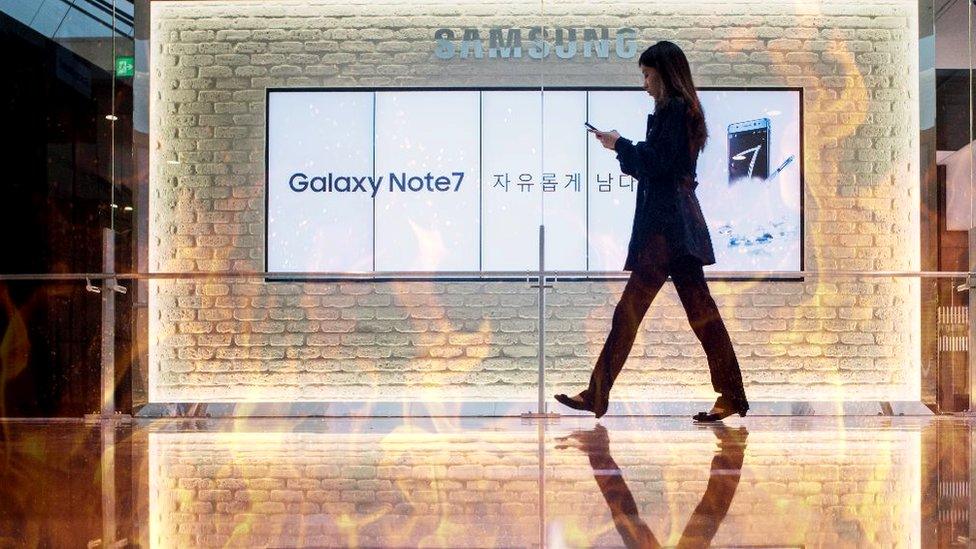
Samsung has killed off the Note 7, but the fiasco poses risk to its brand
Not so long ago, the Galaxy Note 7 was being hailed as the world's finest smartphone.
But this Tuesday, Samsung Electronic's botched recall and re-release of the product cut about $17bn (£13.8bn) off its market value.
The company's shares are still above the level they plunged to when it first announced, in September, that customers should return the initial batch of phones because of a spate of fires blamed on faulty batteries.
But the South Korean markets have not yet reacted to the news that Samsung is killing off the Note 7 for good, following reports that several replacement units had also overheated.
Below, four experts pick through some of the issues raised by the affair.


Prof ManMohan Sodhi, Cass Business School: Was Samsung right to abandon the Note 7?
As Oscar Wilde would have said, to have one product recall may be regarded as a misfortune, to have two looks like carelessness.
The electronics industry faces an increasing amount of power being shrunk into vanishingly small circuits. These circuits get hot and, sometimes, catch fire.
Competition means there is less time available to test products, and many companies have had misfortunes. But Samsung offered a false alternative too quickly. That is carelessness.
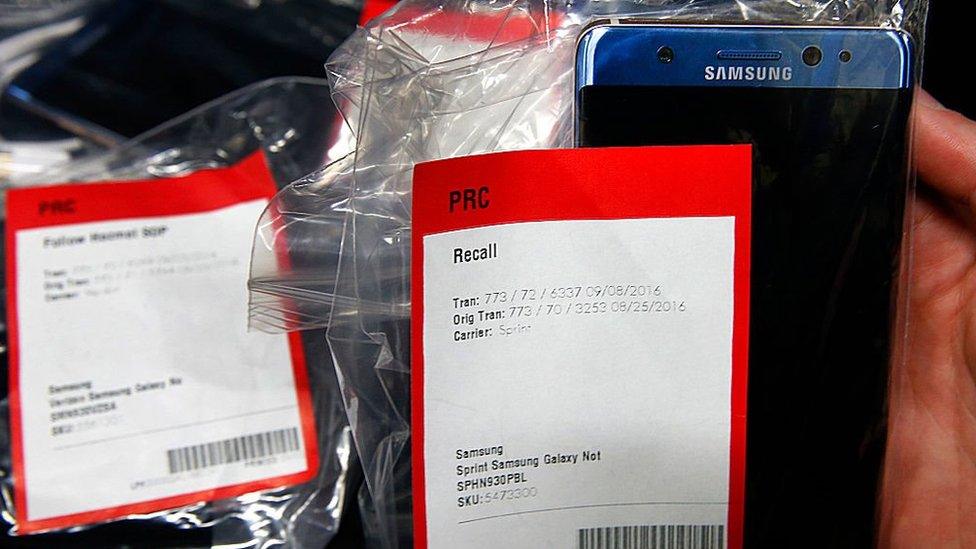
Samsung ordered the first recall of the Note 7 in mid-September
To fight this image, Samsung has announced a permanent stop to the production of the Note 7, following a temporary stop earlier. This gives it room to redesign a brand new product.
But this will only add to Samsung's woes. It will be viewed as panic in the boardroom.
A full recall of existing Notes as well as those yet unsold will be an environmental nightmare besides being economically challenging to the entire supply chain - despite the fact that the vast majority of these phones would have remained in full working order for their working lives.
No, like Volkswagen and its diesel emissions scandal, Samsung should have stuck it out with the Note 7 until the Note 8 became available.
It still has to identify and publicise what caused the phones to overheat if it is to recover its reputation.
And it could have offered free stress tests and compensation vouchers to Note 7 owners, and have convinced the airlines the vetted handsets were safe.
The engineers could have handled the technology problem - panicking was not the solution.


Ian Fogg, IHS: Which rival is best poised to take advantage?
Samsung's competition has been caught by surprise by the Note 7 failure.
Most smartphone makers had chosen not to launch large screen smartphone models - 5.5in (14cm) and above - at this time of year, because they would go head to head with the Note and latest iPhones.
As a result, they are poorly placed to benefit.
Google's new premium Pixel smartphones might seem to be arriving at an ideal time.
But IHS estimates that Pixel production is under one quarter of Samsung's original planned Note 7 volume, which limits Google's ability to replace the Note's market position.
Additionally, Google's mobile operator exclusives - EE in the UK, Verizon in the US, Telstra in Australia - mean many of those who had intended to use the Note 7 on other networks might not switch.
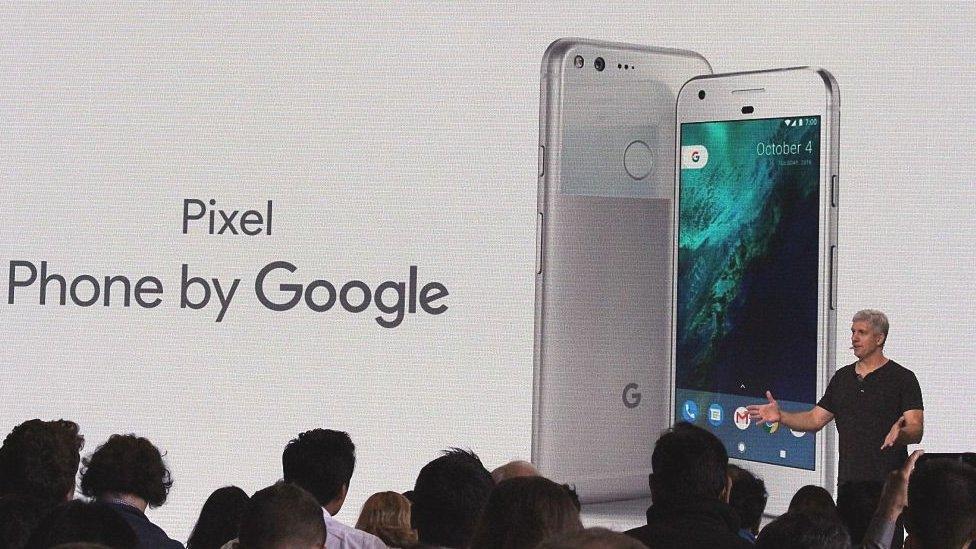
Google's distribution deals for its Pixel phones may limit sales
Other Android handset manufacturers have a few phablet smartphones in the works.
In the US, LG is launching the V20, but it also has low planned production volumes and extremely limited availability in Europe.
Huawei may choose to accelerate the launch of its next Mate smartphone, but its P9 flagship has a modest 5.2in display much smaller than the Note 7's 5.7in screen.
Sony, HTC, and ZTE have no recent large screen premium smartphone to offer.
Samsung will seek to counter its rivals by marketing the S7 and S7 Edge, most likely by reviving its Gear VR virtual reality headset bundles, but the degree of success it enjoys will depend on the extent of damage to its brand.
I expect Apple to raise iPhone 7 production significantly to meet increased demand, especially of the larger Plus model. The Note 7 recall will be an excellent market test of the strength of Apple's appeal to Android owners.
But in the longer term, Huawei will be the biggest beneficiary.
The Chinese company is already performing strongly, has moved into a clear third position in global smartphone shipments - behind Apple and Samsung - and aims to be number one.
If Samsung's main brand is damaged - and not just its Note family - then Huawei will look to pick up sales right across its Android smartphone portfolio.


Prof Will Stewart, The Institution of Engineering and Technology: Are smartphone batteries being put under too much pressure?
Engineers have done a great job of dramatically reducing the energy needed to do any particular job on a smartphone - and the UK has been a real contributor to this - but we have used up this advantage by getting our handsets to do more things faster and better.
So, the energy a phone needs to carry with it is still considerable. Thus, the potential exists for a fire if the energy is released in an uncontrolled way.
Things have not really got worse in the past few years, but they have not got better either.
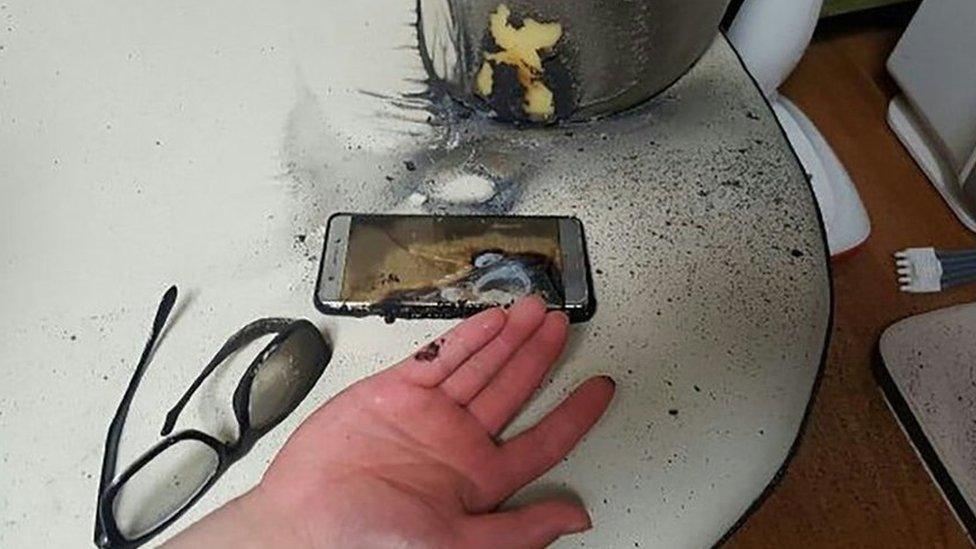
South Korean police released this photo of an overheated Note 7
At this point, it is not clear why Samsung is having problems with batteries from more than one supplier.
It has been suggested they are being put under too much physical pressure - a result of our desire for phones to be as compact as possible. But clearly other compact phones have been fine.
The energy involved is considerable but much less than that in the fuel or battery in your car, for example - indeed no more than the energy I have used cycling round London today. Lithium is a wonderful battery material and holds more energy for a given weight than any alternative.
Only hydrogen is lighter, but as a gas, it is awkward to carry.
So, lithium will continue to be the key battery material.
Batteries will improve in various respects, with the application of nanotech for example.
But as long as the energy is there, the potential hazard is there too.


James P Rooney, vice-chairman of Seoul Financial Forum: Do Samsung's troubles pose risks to the wider South Korean economy?
Because of incorrect statistical analysis, outside observers have long had a significant tendency to massively overstate the importance of Korea's top 30 "chaebol" conglomerates, of which Samsung is the largest.
The most recent data from Samsung Group itself showed its self-estimated contribution to Korea's gross domestic product (GDP) was about 2.5%, and that number probably remains true today.
So, any impact from Note 7 in this current year could be only a very small fraction of that number.
An impact of 0.1% of GDP, which is frankly insignificant at the national level, would probably be an overstatement.
Furthermore, since most of the labour-intensive final assembly is handled at factories outside of Korea, any enforced idleness in those plants is not Korea's problem directly.
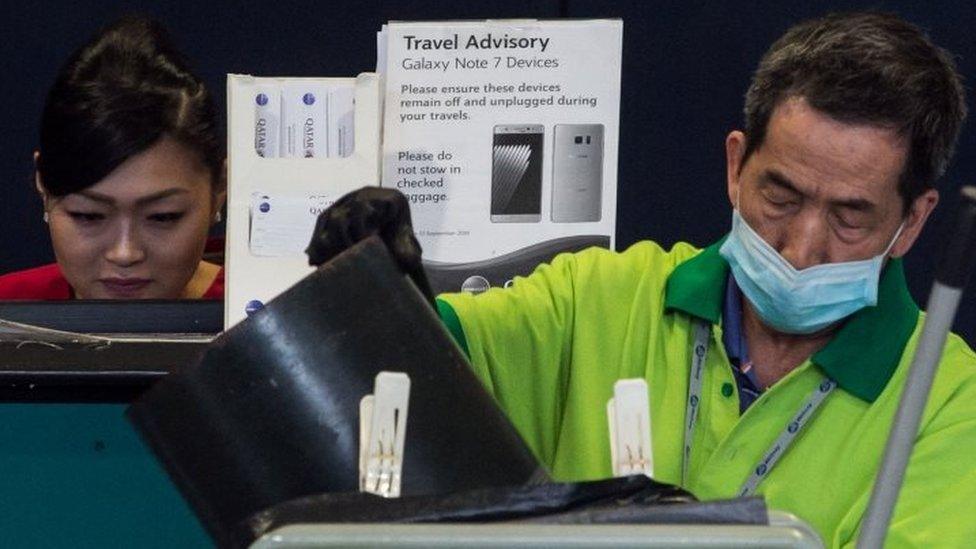
Airlines had banned use of the Note 7 on flights
But any kind of product defect and product recall naturally has an effect on reputation and brand image, both for Samsung and for Korea, as most people view them both as being so intertwined.
This is potentially where the greatest impact will be felt, but it can work both ways - the dark cloud or the silver lining that comes with it.
If the new generation of Samsung leadership converts the real value of this debacle into a constructive lesson in quality and careful design and testing, then it will come out of it stronger and better equipped to continue being successful in the future.
I believe Samsung has handled this need for prompt action well so far.
If it continues to do so, then it can expect to earn the respect of its customers, its investors, its regulators - and in all likelihood its competitors too, all of whom can only be happy that this did not happen to them first.
Korea today makes many excellent and world-class products that are welcome everywhere.
By facing these problems head-on rather than trying to skirt around them or brush them under the rug, everybody gets stronger and reputations grow rather than shrink.
Let us hope that is what is happening here.
- Published11 October 2016
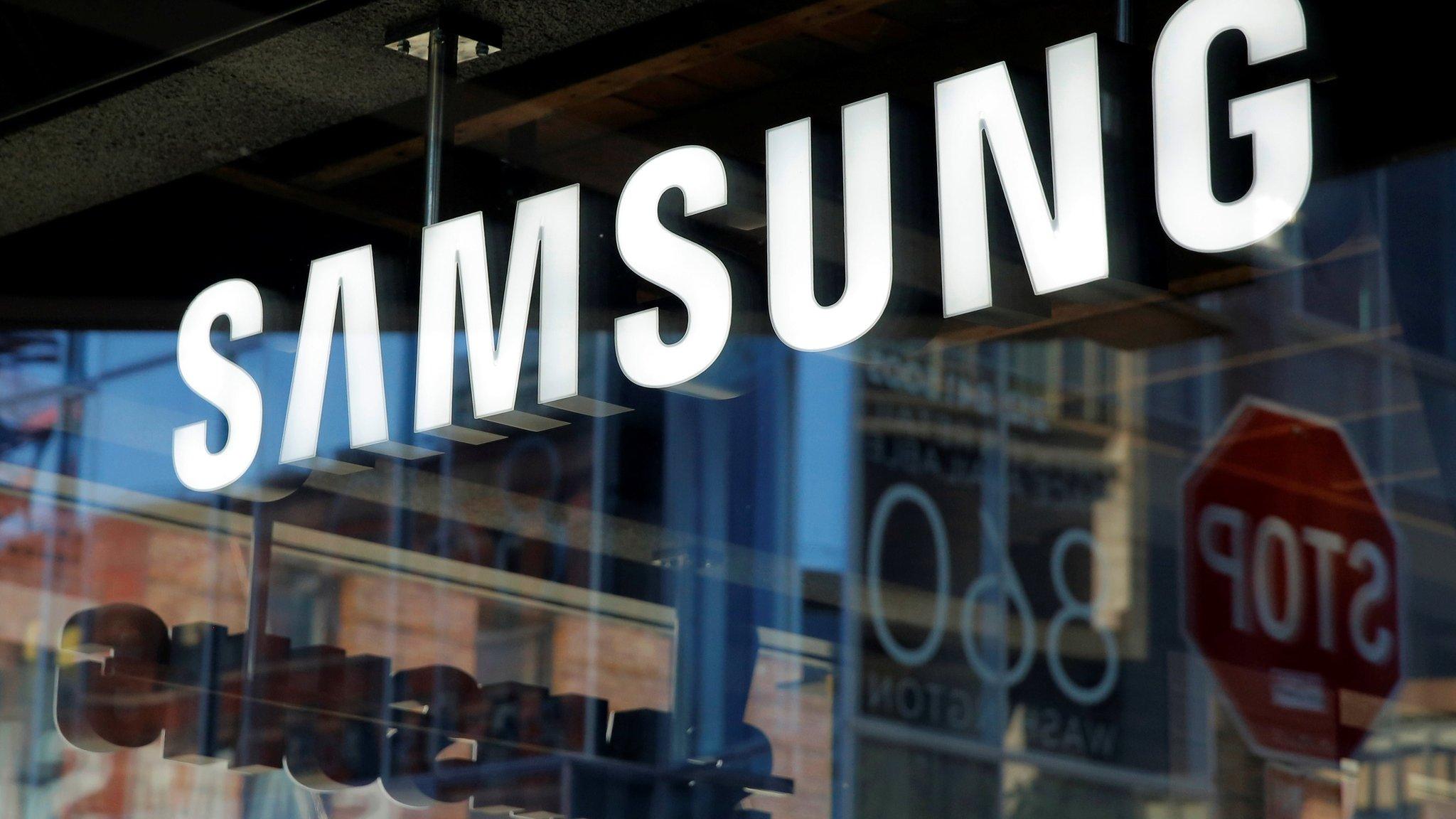
- Published11 October 2016

- Published11 October 2016
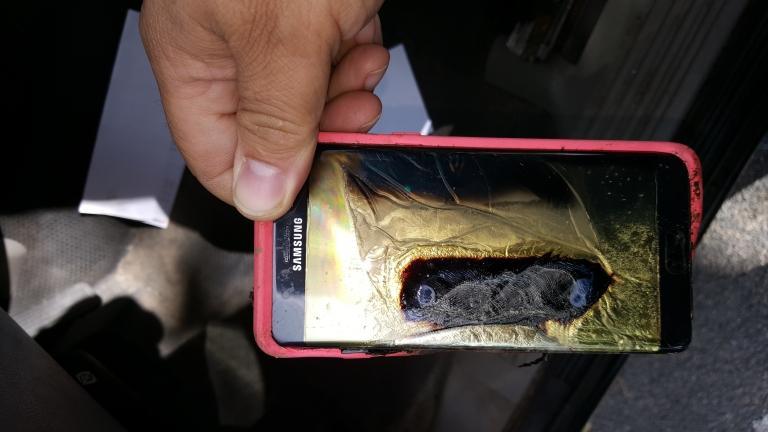
- Published10 October 2016